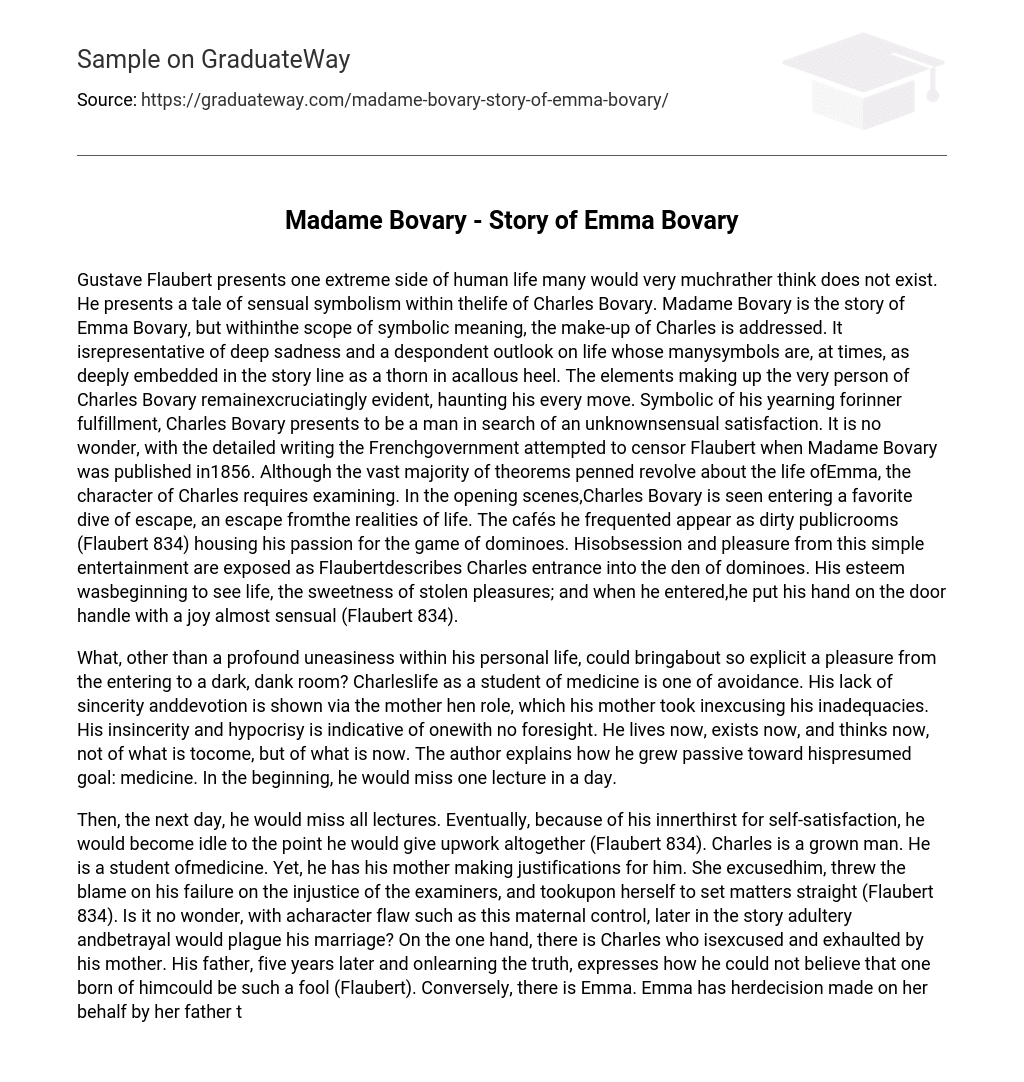Gustave Flaubert presents one extreme side of human life many would very muchrather think does not exist. He presents a tale of sensual symbolism within thelife of Charles Bovary. Madame Bovary is the story of Emma Bovary, but withinthe scope of symbolic meaning, the make-up of Charles is addressed. It isrepresentative of deep sadness and a despondent outlook on life whose manysymbols are, at times, as deeply embedded in the story line as a thorn in acallous heel. The elements making up the very person of Charles Bovary remainexcruciatingly evident, haunting his every move. Symbolic of his yearning forinner fulfillment, Charles Bovary presents to be a man in search of an unknownsensual satisfaction. It is no wonder, with the detailed writing the Frenchgovernment attempted to censor Flaubert when Madame Bovary was published in1856. Although the vast majority of theorems penned revolve about the life ofEmma, the character of Charles requires examining. In the opening scenes,Charles Bovary is seen entering a favorite dive of escape, an escape fromthe realities of life. The cafés he frequented appear as dirty publicrooms (Flaubert 834) housing his passion for the game of dominoes. Hisobsession and pleasure from this simple entertainment are exposed as Flaubertdescribes Charles entrance into the den of dominoes. His esteem wasbeginning to see life, the sweetness of stolen pleasures; and when he entered,he put his hand on the door handle with a joy almost sensual (Flaubert 834).
What, other than a profound uneasiness within his personal life, could bringabout so explicit a pleasure from the entering to a dark, dank room? Charleslife as a student of medicine is one of avoidance. His lack of sincerity anddevotion is shown via the mother hen role, which his mother took inexcusing his inadequacies. His insincerity and hypocrisy is indicative of onewith no foresight. He lives now, exists now, and thinks now, not of what is tocome, but of what is now. The author explains how he grew passive toward hispresumed goal: medicine. In the beginning, he would miss one lecture in a day.
Then, the next day, he would miss all lectures. Eventually, because of his innerthirst for self-satisfaction, he would become idle to the point he would give upwork altogether (Flaubert 834). Charles is a grown man. He is a student ofmedicine. Yet, he has his mother making justifications for him. She excusedhim, threw the blame on his failure on the injustice of the examiners, and tookupon herself to set matters straight (Flaubert 834). Is it no wonder, with acharacter flaw such as this maternal control, later in the story adultery andbetrayal would plague his marriage? On the one hand, there is Charles who isexcused and exhaulted by his mother. His father, five years later and onlearning the truth, expresses how he could not believe that one born of himcould be such a fool (Flaubert). Conversely, there is Emma. Emma has herdecision made on her behalf by her father the day of Charles last visitbefore the engagement. Flaubert represents the affirmative answer to Charlesalleged proposal by the banging of the shutter as her father turns and walkstoward the house. She is, we can only assume, ready to be the wife of a doctor,it making no difference his lack of expertise as a physician, not to mention hislack of masculinity. Charles is a pitiful sight to see. His rebellious naturetoward the attaining of the goal of physician, as obviously prescribed byhis parents, is directly related to Flauberts rebellion toward France inrelation to enforced censorship. The mandatory overseeing of literature, andlimitations thereof, are of prime importance when digesting Madame Bovary. Themany symbolism methods commonly referred to within Madame Bovary are stillobviously there. There is the wedding in the pasture where Emma is forced tostop to remove litter from her dress. The obstacles of her future happiness liebeneath her fringe. She is said to stop to raise the hem of her dress, andcarefully, with her gloved hands, to pick off the wild grasses (Flaubert). Herhappiness falls by the wayside. The plaster priest falls and breaks symbolic ofCharles future failures in his wonderful world of medicine. Furthermore, thisis directing the reader toward the eventual demise of the marriage.
Nevertheless, it is the continued usage by Flaubert of sexual innuendoes andexpressive words that bring one to realize France may very well have beencorrect in its attempt to censor. To understand an author is to read between thelines, then draw conclusions. My conclusion is that Flaubert uses specificscenes to symbolize his flamboyance toward being bawdy. Sometimes she woulddraw; and it was great amusement to Charles to stand there, bolt upright andwatch her bend over her paper, with eyes half-closed the better to see herwork (Flaubert 856). The better to see her work? Perhaps in the eyes of acreator, ones cleavage can be considered work. Although it is talentthat allows a writer to use and coordinate symbolic meanings within his workstoward a specific goal, the plainspoken truth is more easily ingested anddigested. There is merit in the skilled stating of ideals, symbolism in place,without making ones audience uncomfortable. However, within the pages ofMadame Bovary lie a continuous excess of implication, insinuation, andsuggestion.
English Essays





